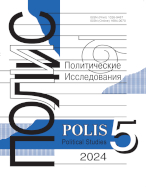The Power Party
Glebova I.I.,
Dr. Sci. (Pol. Sci.), Professor, INION RAS
DOI: 10.17976/jpps/2004.02.09
Glebova I.I. The Power Party . – Polis. Political Studies. 2004. No. 2. https://doi.org/10.17976/jpps/2004.02.09
In the article, an attempt is made to analyze the phenomenon of the Russian “power party” within the framework of the Russian System conception that has been formulated in works by Yu.S. Pivovarov and A.I. Firsov. Proceeding from the postulate that power is the dominant, if not the only, agent of Russian history and politics, the author essays to argue that due to the specific character of Russian Power, the “power party” has not the nature of a party, but that of power. According to her judgment, the “power party” is a form of the Power’s adaptation to the public politics epoch, an instrument, by the use of which it tries to restore modes of existence that are organic to Russian socium. The victory scored by the “United Russia” is, in her opinion, the consequence of its demonstrated concern in the Power, for in our country, Power that has consolidated and has reaffirmed its strength, is the only guarantor of relative stability, order, and security. In this sense, the author holds, the people and the Power (and, consequently, also its “party”) are integrally united and therefore it’s the Power that always wins in Russia: choice “against it” is impossible, because it is “anti-popular”.
See also:
Fyodorov K.G.,
The Policy in the Sphere of Local Taxation in Russia. – Polis. Political Studies. 2003. No4
Sergeev V.M.,
How Are Social Changes Possible? (Prolegomena to a Statistical Theory of Social Networks). – Polis. Political Studies. 2001. No6
Rabotyazhev N.V.,
Phenomenon of “Right-Left” Coalition in Russia: National Salvation Front. – Polis. Political Studies. 2004. No4
Bube M.,
The Role of Parties in the Formation of Political System of Post-War Germany. – Polis. Political Studies. 2004. No6
Peregudov S.P.,
Corporate Capital and Power Institutions: Who Plays the Master?. – Polis. Political Studies. 2002. No5





.jpg)






 print
print
.jpg)
.jpg)